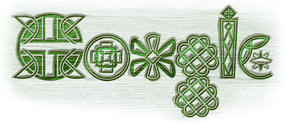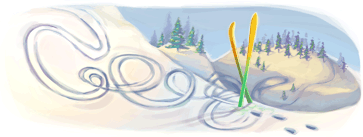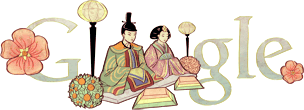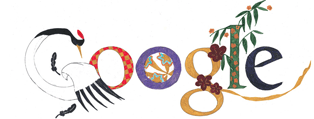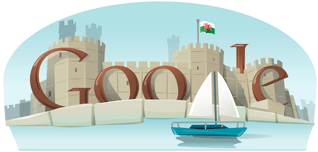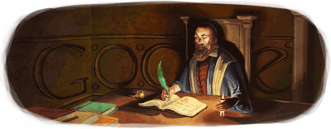 |
| Source: http://www.google.com/logos/komensky10_hp.gif |
Jan Amos Komensky's 418th Birthday
First Transmission of Israeli TV
 |
| Source: http://www.google.com/logos/israeletv10-hp.gif |
Akira Kurosawa's Birthday
 |
| Source: http://www.google.com/logos/kurosawa10-hp.jpg |
Felix Rodriguez de la Fuente's Birthday
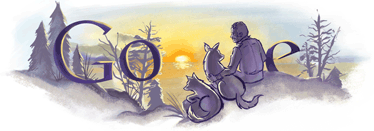 |
| Source: http://www.google.com/logos/delafuente10-hp.gif |
Holmenkollen Ski Festival
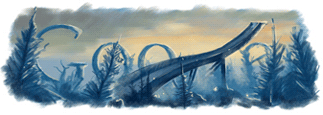 |
| Source: http://www.google.com/logos/holmenkollen2010-hp.gif |
Alessandro Manzon's Birthday
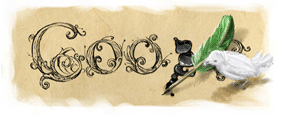 |
| Source: http://www.google.com/logos/manzoni2010-hp.gif |
Manzoni was born in Milan, Italy, on 7 March 1785. Pietro, his father, aged about fifty, belonged to an old family of Lecco, originally feudal lords of Barzio, in the Valsassina. The poet's maternal grandfather, Cesare Beccaria, was a well-known author, and his mother Giulia had literary talent as well. The young Alessandro spent his first two years of life in cascina Costa in Galbiate and he was wet-nursed by Caterina Panzeri, as attested by a memorial plate affixed in the place. In 1793 his parents broke their marriage and his mother began a relationship with the highbrow Carlo Imbonati, moving to England and later to Paris. For this reason, their son was brought up in several religious institutes. Alessandro Manzoni was a slow developer, and at the various colleges he attended he was considered a dunce. At fifteen, however, he developed a passion for poetry, and wrote two sonnets of considerable merit. Upon the death of his father in 1805, he joined the freethinking household of his mother at Auteuil, and spent two years mixing with the literary set of the so-called "ideologues", philosophers of the 18th-century school, among whom he made many friends, notably Claude Charles Fauriel. There too he imbibed the anti-Catholic creed of Voltairianism. [Read more on Wikipedia]
Vivaldi's Birthday
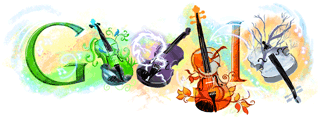 |
| Source: http://www.google.com/logos/vivaldi10-hp.gif |
Many of his compositions were written for the female music ensemble of the Ospedale della Pietà, an orphanage for poor and illegitimate children where Vivaldi worked between 1703 and 1740. Vivaldi also had some success with stagings of his operas in Venice, Mantua and Vienna. After meeting the Emperor Charles VI, Vivaldi moved to Vienna hoping for preferment. The Emperor died soon after Vivaldi's arrival, and the composer died a pauper, without a steady source of income.
Though Vivaldi's music was well received during his lifetime, it later declined in popularity until its vigorous revival in the first half of the 20th century. Today, Vivaldi ranks among the most popular and widely recorded Baroque composers. [Read more on Wikipedia]
| A portrait of Antonio Vivaldi in 1725 |
Frederic Chopin's 200th Birthday
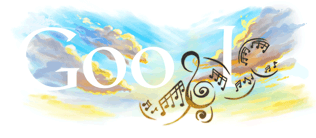 |
| Source: http://www.google.com/logos/chopin10-hp.gif |
Chopin was born in Żelazowa Wola, a village in the Duchy of Warsaw. A renowned child-prodigy pianist and composer, he grew up in Warsaw and completed his musical education there. Following the Russian suppression of the Polish November 1830 Uprising, he settled in Paris as part of the Polish Great Emigration. He supported himself as a composer and piano teacher, giving few public performances. From 1837 to 1847 he carried on a relationship with the French woman writer George Sand. For most of his life, Chopin suffered from poor health; he died in Paris in 1849 at age 39.
All of Chopin's works involve the piano. They are technically demanding but emphasize nuance and expressive depth. Chopin invented the musical form known as the instrumental ballade and made major innovations to the piano sonata, mazurka, waltz, nocturne, polonaise, étude, impromptu and prélude. [Read more on Wikipedia]
| Chopin at 25, by Maria Wodzińska, 1835 |
Subscribe to:
Comments (Atom)

